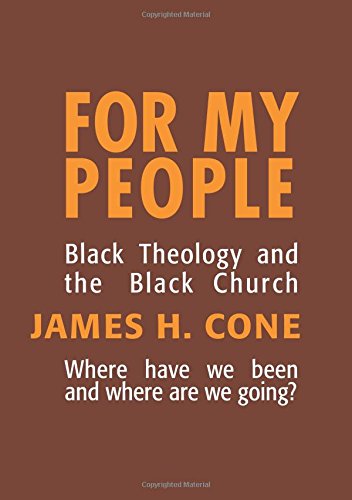Background
James Hall Cone was born in Fordyce, Arkansas, United States, on August 5, 1938.



(Looks at the history of Black theology, discusses its rel...)
Looks at the history of Black theology, discusses its relationship to white and liberation theology, and identifies new directions for Black churches to take in the eighties.
http://www.amazon.com/gp/product/0883441063/?tag=2022091-20
James Hall Cone was born in Fordyce, Arkansas, United States, on August 5, 1938.
After attending the local schools, he received a B. A. degree from Philander Smith College (Arkansas) in 1958, a B. D. degree from Garrett Theological Seminary (Wisconsin) in 1961, and M. A. and Ph. D. degrees from Northwestern University in 1963 and 1965, respectively.
He taught religion at Philander Smith College, Adrian College (Michigan), and beginning in 1970 at Union Theological Seminary in New York City, where he was awarded the distinguished Charles A. Briggs Chair in systematic theology in 1977. He was visiting professor at several colleges and universities throughout the United States, including Drew University, Princeton Theological Seminary, University of Notre Dame, and Howard University. He lectured throughout the world and in virtually every state in the Union.
The decade of the 1960 was a period of great social and racial turmoil in the United States. "Black power" became the clarion call for this more radical segment. The time was ripe for Black theologians to articulate a new vision of theology that would be geared to the Black Power movement. The first major attempt to integrate Black Power with theology was James Cone's book Black Theology and Black Power (1969).
His rhetoric was not likely to win friends among white people, so consequently Cone became the target of a barrage of white criticism.
In his second book, A Black Theology of Liberation (1970), Cone's rhetoric sounds strident if one fails to understand his use of the terms black and white. In looking back on these earlier books, Cone later admitted that he would no longer use the extreme language, but, nevertheless, his condemnation of racism and oppression was as strong as ever. James Cone's influence continued to grow after the publication of his first book in 1969.
He played a major role as catalyst in the emergence of liberation theologies throughout the Third World in their concern to free the oppressed from political, social, and economic misery. He was an effective spokesperson at the meetings of the Ecumenical Association of Third World Theologians, which beginning in 1976 brought together theologians from Africa, Asia, and Latin America. As early as 1977 he had come to see that Christian theology must develop a world-embracing vision that extends far beyond the immediate concerns of Black America and the particularities of the Christian faith.
Cone readily admitted that in his earlier years as a theologian he failed to appreciate that he was guilty of male chauvinism and sexist language, especially with respect to Black women.
He ranks in the top echelon of theologians of all races and faiths today who are most admired and respected. In addition to his incisive writings he was a brilliant lecturer and a fiery preacher. And if the medium is the message, then the teachings of James Cone find their most eloquent testimony in the charisma and quality of his personal life and human relationships.
He was the author of the first major attempt to integrate Black Power philosophy with theology. He became the leading exponent of Black theology in the decades following the 1960. His most famous book Black Theology and Black Power (1969). He was a strong critique of the White church and white man for ignoring or failing to address the problem of race.
Cone received the American Black Achievement Award, in the category of Religion in 1992.
(With the publication of his two early works, Black Theolo...)
(Looks at the history of Black theology, discusses its rel...)
(Cone explores two classic aspects of African-American cul...)
(Firmly rooted in the black church tradition, James H. Con...)
He and his family attended Macedonia African Methodist Episcopal Church. He retains his earlier strong critique of the White church.
Cone developed the thesis that Black Power is "Christ's central message to twentieth century America, " that Black Power means "complete emancipation of Black people from white oppression by whatever means Black people deem necessary, " and that "Whether whites want to hear it or not, Christ is Black, baby, with all the features which are so detestable to white society. "
For Cone, blackness is a symbol for the oppressed and whiteness is a symbol for the oppressor. In his subsequent writings Cone consistently maintained the use of these symbols.
Quotations:
He explains: "Being black in America has very little to do with skin color. To be black means that your heart, your soul, your mind, and your body are where the dispossessed are. .. . Being reconciled to God does not mean that one's skin is physically black. It essentially depends on the color of your heart, soul, and mind. "
He wrote in Cross Currents in 1977: "I think that the time has come for black theologians and church people to move beyond a mere reaction to white racism in America and begin to extend our vision of a new socially constructed humanity in the whole inhabited world. .. . For humanity is whole, and cannot be isolated into racial and national groups. "
One of the most remarkable qualities about James Cone was his ability and willingness to grow and change with the times as he confronted new challenges. Cone's willingness to learn as well as to teach was a mark of his true greatness.
